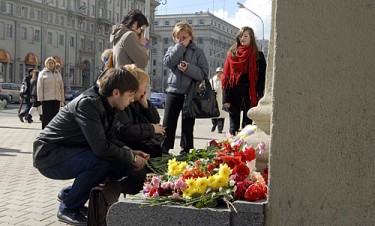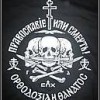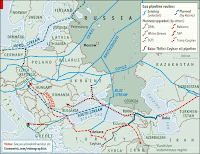 For Global Voice Online: As casualty numbers rise from Sundays' ferry catastrophe on the river Volga, Russians have come to the bitter realization of yet another tragedy, with a death-toll of well over a hundred people. As usual, news of deplorable conditions are brought to public attention, causing popular anger and indignation, but this time these feelings almost seem to outdo those of sympathy with the victims and their relatives, as the Russian blogosphere reacts to the tragedy.
For Global Voice Online: As casualty numbers rise from Sundays' ferry catastrophe on the river Volga, Russians have come to the bitter realization of yet another tragedy, with a death-toll of well over a hundred people. As usual, news of deplorable conditions are brought to public attention, causing popular anger and indignation, but this time these feelings almost seem to outdo those of sympathy with the victims and their relatives, as the Russian blogosphere reacts to the tragedy.On Sunday afternoon, July 10, 2011, the "Bulgariya" cruise-ship capsized on the Kuibyshev dam of the Volga river. According to official figures [ru], 129 passengers are still missing and have supposedly perished in the waves.
How people react to disaster and catastrophe is often quite telling of the times and circumstances they live in, and what they expect from the future. In disaster-ridden Russia, such tragic events are often an opportunity to display national unity in commemoration of the victims, which people usually show great respect and reverence to. Thus, President Dmitry Medvedev declared [ru] 12 July, 2011, a national day of mourning.
Still, reading Russia's blogosphere, the sense of national foreboding seems to overshadow that of mourning, as - for many bloggers - the sunk vessel comes to symbolize the future fate of Russia.
At first though, the deplorable state of the ship was a subject of intense discussion, both in mainstream media and on blogs. Whereas information is diverse and varies, the overall impression is that of a floating coffin. The relatively moderate - and changing - data on the Bulgariya on Russian Wikipedia [ru] is quite telling: Built in 1955, no waterproof bulkheads, no major overhauls, name-change last year, low lateral stability, leaving port with a 5 percent starboard list, left engine out of order, 208 people on board instead of the assigned 140 maximum; all in all led it to sink in merely three minutes.
One does not have to be a sailor to see that "Bulgariya" was not seaworthy, and one can only imagine the number of hurdles the people running it must have jumped to get it past naval safety inspection and other controls.
Feelings of anger and wrath are also raging among bloggers. Voices from Russia expresses the many demands for vengeance, but also exploits the tragedy in calling for a more authoritarian Russia:
Suffice it to say, heads are gonna roll as a result of this. The responsible parties are gonna get learned, kiddies… they’re going to absorb the full meaning and implications of каторга (katorga: forced labour) in Correctional Colony 1313 in the Sakha Republic… or, they’ll have the pleasure of the multifarious joys of Correctional Colony 3131 on Cape Anadyr. They fought the law and the law won! It ain’t nice to fool around with Papa VVP… things tend to happen (like bustin’ rocks under the Arctic sun). It’s not like the Republican Wonderland of Texas… where Kenneth Lay of Enron fame (pal of GWB and loudmouthed Born-again “Christian”) didn’t serve a day in prison. You can have an attitude like Russia’s, where miscreant businessmen go to jail… or, you can have an attitude like Texas, where buccaneer businessmen are coddled. In 2012, you can choose… choose well… for you’ll not get a “second chance”.
Contrary to this, a great number of bloggers show distrust towards government authority, pointing to its recorded pattern of bad information management even when confronted by obvious crises and disasters. Thus, initial official information of the Bulgariya catastrophe spoke of an accident but no casualties.
An early comment, by LJ user 999allan999 responds to this simply by presenting [ru] a number of assorted news items on the accident with the suggestive title:
Как обычно. Сначала официально-бодрое «жертв нет»…
As usual. At first the officially cheerful «no victims»...
LiveJournal user shri_boomer - a naval officer himself - relates [ru] to this, but also voices his loathing of the people on passing ships who filmed the Bulgaria's drowning passengers:
Во время этой трагедии, поразила не только неспособность государства, дать какую-то вразумительную информацию обществу, но и то, что мимо тонущего судна спокойно проходили другие теплоходы, а люди стоявшие на палубе снимали трагедию на видеокамеры и телефоны. Эта дикость, от которой мурашки бегут по коже, свидетельствует только об одном: люди настолько зачерствели, что перестали быть людьми.
During this tragedy, I was struck not only by the state's incapacity of providing society with some sort of intelligible information, but also that other ships silently passed by the sinking ship, and people stood on deck filming the tragedy with video cameras and [mobile] phones. This is a savagery that makes one feel like ants are running across one's skin, and only testifies to one thing: People have become so petrified, that they have ceased to be human.
Recollecting merely the most recent disasters, shri_boomer goes on [ru] criticizing the government's tendency to write off everything that does not work and increase control of that which still seems to work, although nobody will obey:
Налицо все признаки того, что питерская ОПГ, теряет контроль в управлении страной [---]. Каждый день государственная власть поражает нас новшествами по усилению безопасности граждан и обустройству России.Взорвалась бомба в Домодедово – досмотр пассажиров ужесточить, Домодедово отобрать. [---]Списать самолеты «Ан», списать вертолеты Ми-8, списать речной флот. Да, что там, списать устаревшего девяносто процентов трамвайно-тролейбусного парка страны, десятки тысяч автобусов, миллионы километров водопроводных труб и линий передач, сотни ТЭЦ и ГЭС. Все это нужно списать, а досмотр пользователей ужесточить. [---]После всего этого можно будет списать население. И тогда наступит настоящий День Траура. Жаль только, что соблюдать его будет некому, ибо придет Время Троглодитов.
There is every evidence of the St. Petersburg gang losing control of managment over the country [---]. Each day state power introduces new measures to strengthen the security of its citizens and to upgrade Russia.A bomb exploded at Domodedovo [airport] - stricter passenger control, and closing Domodedovo.Writing off «An» aircraft, writing off Mi-8 helicopters, writing off the river fleet. Yes, and in addition, to write off the obsolete 90 per cent of the tram and trolley-bus fleet of the country, tens of thousands of buses, millions of kilometres of water pipes and transmission lines, hundreds of power stations and hydro-electric plants. All this needs to be written off, and control of users tightened. [---]After all this, one might as well write off the population. And then we will have a real Day of Mourning. It's a pity only, that no-one will observe this, or [if they will] then comes the time of the Troglodytes.
Drawing on similar sentiments, LiveJournal user dr_lunikoff compares [ru] the era of the Soviet demise with today's situation:
В связи с этим вспомнился стишок 1989 года, который ходил тогда у нас по рукам и из-за которого нас чуть из школы не выгнали. Стишок был выучен наизусть (чтоб не быть пойманным с крамолой на руках), потому и запомнился. Он описывал самые заметные ужасы катастройки (в частности, гибель теплохода "Адмирал Нахимов" в 1986 году) и до ужаса был похож на сегодняшние реалии:
Утопили пароход,Пропустили самолет,Наркоманов развели,СПИД в Россию завезлиИ какая-то пи..даС рельсов валит поезда...
Relating to this, I came to think of a small poem from 1989, which then passed from hand to hand and almost got us thrown out of school. The poem was learnt by heart (so that they could not catch us with sedition on our palms), and therefore I remember it. It described the most notable horrors of katastroika [combined catastrophy and perestroika], (especially the loss of the ship "Admiral Nakhimov" in 1986) and is terrifyingly similar to today's realities.A ship sank,A plane was lost,Addicts spread,AIDS was brought to Russia,And whatever f...ing elseAnd the trains are sliding off the rails...
Finally, Viktor Perfilov of Kazanskie vedomosti sums up [ru] the feelings:
Я невольно вспоминаю ту известную фразу Путина о АПЛ "Курск", хотя в то время мне и 10 лет не было- Что случилось с Вашей лодкой?- Она утонула
А Медведев пока не нашел, что сказать на сей счёт. Системный кризис [---] проявляется всё больше, а положение лучше не становится. И лучше при нынешней ситуации вряд ли станет...
I cannot help recalling Putin's famous phrase about the submarine "Kursk", even if I wasn't even ten at the time:- What happened with your boat?- It sank.And Mededev has still not found out what to say about this. The systemic crisis is increasingly evident, and the situation is not getting any better. And under current circumstances, it is not likely to.



























